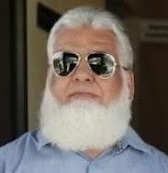Prof Asaad Javaid Mirza
An ecosystem refers to a thriving community of animals and plants interacting with each other and non-living environment on the earth. It involves processes such as energy flow, nutrient cycling, and the exchange of materials and ranges from a low scale to a large scale. Ecosystems meticulously clean our water, regulate climate and provide shelter for a staggering number of living creatures. It also recycles essential nutrients and the chemical substances found in living things – necessary for the lives of people, plants, animals, and organisms.
Almighty Allah, the Creator, has bestowed upon humanity a beautiful and safe place to inhabit. From the vastness of the oceans to the majesty of mountains, the diversity of ecosystems, and the intricacies of life forms, the earth is a manifestation of Allah’s grace and creativity. The intricate balance of natural systems, the provision of resources, and the harmonious coexistence of life forms reflect Allah’s wisdom and care for His creation. It is incumbent upon humans to appreciate and cherish this invaluable gift, ensuring its preservation and sustainability for future generations. It is regretfully observed that human activities have led to a myriad of challenges for the earth, impacting various aspects of the environment and ecosystem.
The change in climate is the most devastating impact on our lives. Our activities such as burning fossil fuels, deforestation, and industrial processes have significantly increased gas emissions, leading to global warming and climate change. This has resulted in rising temperatures, extreme weather events, sea-level rise, and disruptions to ecosystems and biological diversity (biodiversity). Pollution from industrial emissions, agricultural runoff, plastic waste, and improper waste disposal contaminates air, water, and soil. This pollution not only harms our health but also impacts wildlife, ecosystems, and the overall functioning of the planet. Deforestation, habitat destruction and overexploitation of natural resources have led to a rapid decline in biodiversity. This loss of species diversity threatens ecosystems, disrupts ecological balance, and reduces resilience to environmental changes.
Depletion of resources is another endangering impact on human survival. Unsustainable consumption patterns and exploitation of natural resources, including water, minerals, and fossil fuels, have led to depletion and degradation of these resources. This threatens future availability and compromises the ability of ecosystems to provide essential services. Growing populations, industrialization, and agricultural demands are leading to increased water stress and scarcity in many regions. The mismanagement of water resources, pollution, and climate change further exacerbate this issue, affecting ecosystems, agriculture, and human livelihoods. Overfishing and ocean acidification are also causing significant degradation of marine ecosystems. This impacts marine biodiversity, fisheries, and coastal communities, while also affecting global climate regulation and nutrient cycling.
The main responsibility of dentists lies in preserving and enhancing the oral health. Though the environmental impact of dentistry might appear modest compared to industries, dentists’ decisions and actions can still contribute significantly to broader environmental conservation and sustainability efforts. They can fulfill this role by embracing Green Dentistry, an approach focused on environment friendly and sustainable dental practices. The idea behind it is to diminish the ecological impact of dental services by adhering to the principles of the 4 R’s: Reduce, Reuse, Rethink, and Recycle.
Dental practices generate various types of waste, including amalgam waste, plastic packaging and single-use items. Dentists can implement waste reduction and recycling programs in their clinics to reduce environmental impact. Proper disposal of hazardous materials such as mercury ensures reduction in environmental pollution.
Similarly, dental procedures consume huge amount of electricity which can be reduced by using latest technologies such as motion sensors, turning off light and the use of LED lights in the clinics. Dentists can implement water-saving techniques and choose eco-friendly materials and equipment that have minimal environmental impact. The use of digital X-rays instead of conventional X-rays not only reduces the amount of radiation but the quality of image is also highly improved.
Emphasizing preventive dental care reduces the need for extensive treatments, which can generate more waste and consume more resources. Dentists can educate the patients about oral hygiene practices and dietary habits that promote oral health, ultimately reducing the environmental effects of dental procedures. They can raise awareness among the patients and community about the connection between oral health and environmental sustainability. By promoting eco-friendly practices and providing information on how dental care choices can impact the environment, they can inspire individuals to make more sustainable decisions.
Numerous dental tools and instruments are capable of being sterilized and utilized repeatedly before requiring replacement but instead of disposable bibs and towels, dentists can choose reusable options that can be washed between uses. Likewise, rather than discarding lead aprons and collars after each use, they can invest in robust, long-lasting alternatives that can withstand multiple uses. Containers utilized for storing substances such as alginate or dental amalgam are often cleanable and reusable.
Moreover, dentists ought to recommend toothbrushes crafted from recyclable materials such as polypropylene. They should promote the utilization of dental floss, toothpaste, mouthwash and other dental products packaged in recyclable materials like plastics or aluminum, which can be recycled after use. Dental amalgam, which contains mercury, necessitates proper recycling to avert environmental contamination. The recyclers have engineered processes that ensure safe extraction of 99% mercury from the waste.
Last but not the least, adopting digital patient records and communication methods can decrease reliance on paper and the space needed for storage. Dentists can find substitutes for disposable items such as plastic cups, straws, and mixing bowls and opt for reusable or biodegradable options that lead to a substantial reduction in waste collection. The dentists, through implementation of these approaches, can enhance the eco-friendliness of their practices and contribute to fostering a healthier planet.
The writer is working as Dean, Faculty of Dentistry, Baqai Medical University, Karachi. He may be reached at: asaadjmirza@gmail.com.
Related Posts






Comments